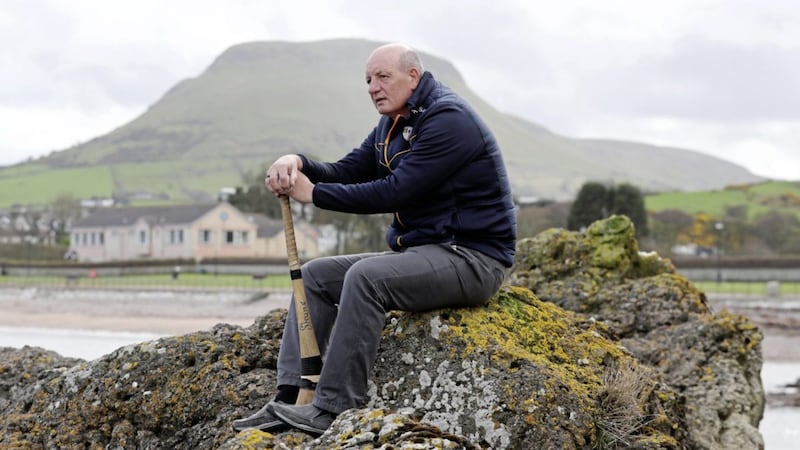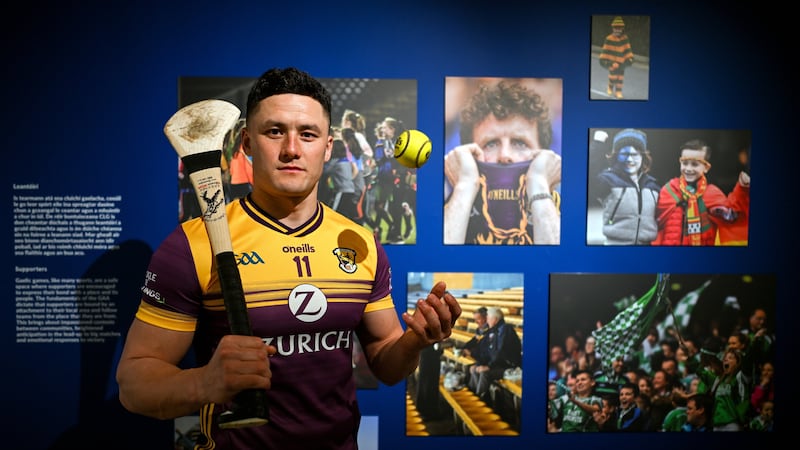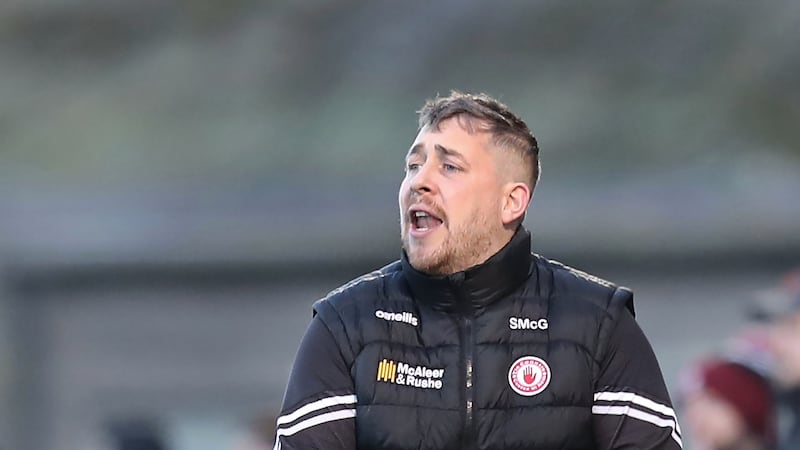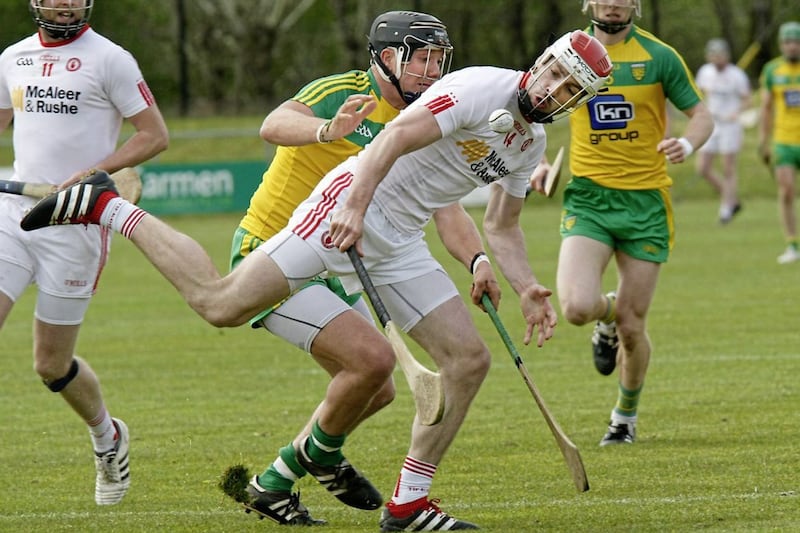In a special two-part interview, former Antrim hurling legend Terence McNaughton tells Brendan Crossan about the challenges he faced growing up with a speech impediment and how hurling became his salvation...
TERENCE McNaughton estimates there was £2.50 in his bedroom drawer. A lot of money for a kid to be hoarding back in the early seventies.
One day his mother stumbled across the pile of unspent coins and asked her youngest son of their origin.
But he couldn’t explain them, literally. The words just wouldn’t come out. And that was his problem: communicating.
His parents – Charlie and Mary – and his brothers and sisters would give him money to buy sweets.
But he never could.
McNaughton reckons he was in P2 in school when he first developed a speech impediment.
The idea of walking into a shop and asking for sweets filled him with absolute dread.
“People used to give me money to buy sweets and I would never have gone into a shop. If I had been in the desert and had to buy water, I wasn’t getting the water,” he says.
“I just couldn’t communicate. I threw the money in the drawer and then my mother found it. I shouldn’t have had that kind of money.
“I would’ve walked away from people if they’d ask me the time in the street.
“They must have thought I was being ignorant.
“The speech impediment affected every aspect of my life. If you could understand the amount of things I couldn’t do. I couldn’t even tell people I was sick, if I was sick.
“Every aspect of your life. You’d have doors slammed in your face when you were going to ask for your friend and you’d start stuttering. You were always an easy target for being slagged. There’s nothing that affected me more than that. I didn’t communicate with anybody.”
“He’s a successful businessman and a successful sportsman. That gives you standing. To quote [the late] James McNaughton, he said he would give him more credit for beating his speech impediment than any of the things he achieved on a hurling field, and he achieved a hell of a lot on a hurling field.” - Neil McManus
SWEEPING down the winding road of Glenballyeamon towards Cushendall village is good for the soul. The Amalfi Coast wouldn’t hold a candle to this panoramic beauty.
The pale green landscape is aching to be a deeper, richer shade to signal summer’s imminent arrival.
Mount Lurig is off to the right and the sea in the distance. The views look like a carefully crafted lego set.
It’s a bright Friday morning and Terence McNaughton greets me at the doors of The Lurig Bar.
It looks as though his bar on the main street of the village has had a fresh lick of paint – cream with purple trim.
Lucy, his sister-in-law, is behind the bar and hosting a couple of locals who are making their cool beers last.
The premises open up like a tardis.
Terence takes me on a guided tour of the place.
In one of the function rooms hangs umpteen framed once-we-were-young team photographs of bygone days.
We eventually settle at the back end of the bar where the jukebox sits beside a perfectly maintained pool table.
Terence and his son Christy have ensured the jukebox is packed with Bruce Springsteen albums.
“Do you know, I’ve brainwashed all these young fellas around here with Springsteen’s music,” he says.
“The likes of Eoghan Campbell and all those boys are Springsteen fanatics because I used to carry the tapes around in the car and tell them about each song…
“They’d be at that jukebox there and put Springsteen on.”
McNaughton opens his tin of tobacco and fixes himself a roll-up.
A few days have passed since the Antrim hurlers were relegated back to Division Two.
He’s still reliving the small details of the Laois game in Dunloy that cost them their place in Division 1B.
It was one of Antrim’s better League campaigns, yet they still went down.
McNaughton, Dominic McKinley, Gary O’Kane and Neal Peden have a few weeks to get the team ready for a crack at the Joe McDonagh Cup. Their season is still full of infinite possibilities.
McNaughton is 54 years old and recently became a grandfather.
Scrape the surface and a passion still rages for stitched leather and ash.
He will always bleed Ruairi Og and Antrim.
Life is good for Antrim’s 1991 Allstar winner, who retired from the inter-county scene in 1997 and soldiered for a few more years with his club.
The stammer that caused him so much angst as a kid is barely traceable these days.
“Whenever he’s in the middle of a team-talk, there is no speech impediment,” says club-mate and county hurler Neil McManus.
“Whenever he’s talking about hurling, there is no speech impediment because it makes sense to him. It’s just natural.
“If you asked him to stand up and read you a page from a book, I’d say he probably would struggle – but not when he’s talking about hurling.”
You know someone has faced their demons by how candidly they talk about them.
McNaughton is an open book.
He remembers wailing every night, pleading with his mother not to send him to school the following morning.
“People tell you school is the best days of your life. I hated school with a passion,” he says matter-of-factly.
“The best day I ever had was the day I left school. The only time I enjoyed school was when there was a hurling match on.
“I can’t express enough how much I hated school. Every night I cried because I didn’t want to go. I remember countless nights telling my mother that I didn’t want to go to school.
“From P2 onwards I developed this speech impediment. It gradually got worse and it got to the stage where I couldn’t put two words together.
“I had one teacher who thought he could beat it out of me. He’d bring me up to the front of the class and stand and read. Any time I stuttered he’d hit the back of my head with a book.
“‘Stop stuttering’, he’d say. ‘Stop stuttering’. He embarrassed me in front of the class. He honestly believed he could beat it out of me. Every day that went on.
“There were a couple of teachers that really stood out and to this day I can’t believe the things they did to me.”
McManus is best friends with McNaughton’s eldest son, Shane. They lived in each other’s pockets and were never out of each other’s homes.
McManus reflects: “How a speech impediment was treated, from a medical and an educational standpoint, in those days was shocking. It was bordering on the inhumane.
“To have the strength and resilience within yourself and to overcome that was a huge achievement. You need a certain attitude where you say: ‘No, this won’t define me.’
“That’s what Terence did.”
The system of the day decreed, bizarrely, to send young McNaughton to a special needs school in Larne every Monday because of his speech impediment.
Sitting back in the pub he has built from scratch, and Lucy supplying us with coffee, McNaughton winces at the memory of boarding that bus every Monday morning.
“Going to that school in Larne was the worst thing I could imagine. I felt there was something wrong with me. You weren’t old enough to know or think about what was happening or why it was happening.”
McNaughton doesn’t have to look too far to find humour in the darkest places.
Laughing, he remembers: “I was taught to say: ‘How, Now, Brown, Cow.’ Bullshit like that you had to repeat. It stays in my head now: ‘How, Now, Brown, Cow.’
“I wasn’t academic, so I rebelled. It’s a regret I have that I don’t have qualifications. I left school with basically nothing. School, to me, was lashing out and being taunted.
“And when I went to secondary school, guys from other towns went to the school, so it started all over again. So I lashed out again. And then when you became a certain size, you became unteachable. I was uncontrollable.”
“He had very good vision, good hands. You never saw him in trouble with the ball. He wouldn’t have been hooked or blocked very often and he was also a very good striker of the ball.” - Former Antrim team-mate Ciaran Barr
CHARLIE McNaughton came from Cavan and Mary McGrath hailed from Derry. The couple settled in Cushendall and had 14 children.
They became known as the “Belturbets” in and around the village.
Terence was the youngest.
His father was a keen musician and spent most of his life at sea.
“By the time I came along my father was an old man. He wouldn’t have been out pucking about with me; it wasn’t that sort of relationship.”
Terence, aged 14, was the only one at home when his father suffered a massive heart attack just after Christmas in 1979. He managed to carry Charlie upstairs before rushing to neighbours for help.
He died a couple of days later in hospital. Terence remained close to his mother and lived with her until he married Ursula Lemon in Rome on June 1 1987.
Mary, his mother, never watched her son play hurling but sewed prayers into his shorts for good luck before games.
“I love the game. It’s a great game to play, it’s a great game to watch. It beats any other game. It does. I’ve yet to find anybody who played it or didn’t play who disagrees with that. It is the perfect sport.” – Terence McNaughton
NOTHING was pre-ordained about McNaughton becoming a famous hurler. He never harboured dreams of playing for Cushendall or Antrim. It just happened.
He’d spend hours up at James Stewart’s ruined cottage hitting a ball against one of the walls with half a hurl.
“We’d no x-boxes back then and you didn’t control the TV that had three stations. Your father controlled that. You couldn’t watch TV so what do you do?
“It wasn’t a conscious decision of: ‘I’m going to be a good hurler’. You’d nothing else to do.”
Ironically, it was a schoolteacher – Alex Emerson – who McNaughton credits for nuturing his hurling talent.
“Hurling was the only thing I was getting credit for,” he says. “I enjoyed the game and I was able to hit it alright.
In 1977, Ruairi Ogs won the U12 North Antrim Championship.
It was the first title the Cushendall club had won in years and McNaughton was lauded for his performances.
While school failed the youngster, hurling opened up a whole new world to him. Even though he was destined for club and county success, he still had an army of doubters.
Pulling on his cigarette, he says: “There are different things that stick out in my mind. I was told by a member of our club that I would never play senior hurling because I was overweight, a pudgy child.
“I can remember everything about that day. I can remember the smell of the cut grass, I could tell you what he was wearing. It was like putting a knife into me because I thought this was the only thing that I was half-decent at.”
A young teenager at that time, McNaughton found the resilience from somewhere and thrived on a hurling field.
His preferred position was half-back but because of his natural ability and size, you could find him at full-back, midfield or full-forward on any given day.
“My own club helped me. There was no set structure for them to help me, but they did help me. I didn’t have to communicate. When you crossed the white line, you don’t really have to communicate.”
Recently, there was a young hurler at the Cushendall club with rich potential. Like McNaughton, he suffered from a speech impediment.
“I took a shine to him,” McNaughton says.
“He was a good player too, but he left and went cycling because maybe he’s happier cycling, when he’s on his own and he doesn’t have to communicate. He’s a great cyclist now.”
In 1981, Cushendall won their first-ever county title, beating county kingpins Ballycastle after a replay. McNaughton was just 16 and was entrusted with marking Peter Boyle, arguably the best hurler in Antrim at the time.
The young Cushendall defender held Boyle to a point across the two games. It was after those pair of performances he appeared on the county’s radar.
“It was different back then. If somebody had deodorant they’d be classed as soft. We’d a lot of very strong characters – Danny McNaughton, John Delargy, Paddy McAteer – nobody worried about your feelings. You didn’t have to think: ‘How do I say the negative and say the positive?’
“You got the negative and that’s all you got.”
McNaughton earned his senior debut with Antrim earlier than anticipated under Neilly Patterson and Gilly McIlhattan.
Like many GAA teams, going to Mass on the morning of a game was ritual. On this particular morning, prior to a League game with Kildare in Newbridge, one of the Antrim players didn’t attend Mass and was duly dropped from the starting line-up.
McNaughton, originally named on the bench, was promoted to the starting line-up.
“I remember Peter Boyle saying to me: ‘You’re going to be here forever.’ That was in ’81 and I quit in ’97.
“You learnt very quickly in that changing room and you had to stand up for yourself. God rest, Brian Thompson [trainer], who used to say: ‘I need danger money to train Cushendall’ because we would have fought with each other every other night at training.
“You had to deal with conflict but coming from the school environment, conflict never really worried me. It was just part of you.”
Hurling was important to McNaughton but it wasn’t everything. He gave Australia a try as he’d two brothers in Melbourne doing well for themselves.
“I liked Australia,” he recalls. “I was actually enjoying it. I was 18, I had a girlfriend. I was going to work in a pair of shorts. I had a motorbike. I was living the dream.
“My two brothers went off to work in New Guinea for a while and I was left on my own over Christmas. I think it was Christmas Day and I started to watch a movie on TV and there was snow in it.
“I don’t know what happened but I was working out what time it was back home and thinking that everyone would be going to McNaughton’s Disco in Waterfoot. I just took homesick and on the 12th of January I was back home.”
Australia was a nice detour, but McNaughton’s life was mapped out.
The ‘Troubles’ raged in the north during the 1980s but, against the odds, Jim Nelson was moulding a talented group of Antrim hurlers into All-Ireland contenders.
It was clear Terence McNaughton would be an integral part of Nelson’s lofty plans…
In Monday's edition, Part Two of 'The life and times of Terence McNaughton': "Terence McNaughton was a really fair player. He was a great hurler as well, very skilful for a guy of his size. He was a hard player but he was a gentleman. In that 1989 All-Ireland final he carried the fight to Tipp." Former Tipperary star Nicky English








